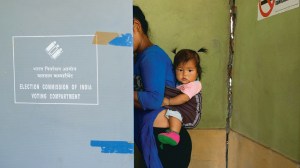- India
- International
Trading a new route
India has completely rebranded its partnerships in Africa
During Prime Minister Manmohan Singhs visit to Addis Ababa earlier this week,a leading Ethiopian newspaper prominently published a picture of Mahatma Gandhi with his quotation saying,The commerce between India and Africa will be of ideas and services,not manufactured goods against raw materials after the fashion of Western exploiters.
What Gandhi said decades ago is being adopted as a leitmotif of Indias foreign policy for the African continent,widely seen as the biggest driver of global growth in the decades ahead. While addressing the second India-Africa Forum Summit at Addis Ababa,Manmohan Singh clearly emphasised,Africa possesses all the pre-requisites to become a major growth pole in the world. India-Africa partnership is unique and owes its origins to history and our common struggles against colonialism,apartheid,poverty,disease.
Clearly,India is trying to position itself in the African continent as an equal partner with immense soft power as opposed to China,which pursues a more instrumental relationship based on pure commerce and exploitation of natural resources. India will have to work very hard at this brand differentiation from China. It is not an easy act to follow.
For it is also a fact that fast growing emerging economies like China and India are trying to access precious resources like oil and metals around the world to secure their future growth. Only China is going about its task of securing resources far more aggressively,creating a scare among other nations.
The Western exploiter of raw materials in Gandhis imagination could well be substituted by a non-Western entity like China or even India. The West is already peddling this narrative. Indeed,there is a growing perception among the intelligentsia in many resource-rich African nations that China is too focused on grabbing natural resources. Of course,the Chinese are also funnelling huge amounts of money in critical infrastructure like airports,roads and bridges in Africa. Many African governments have welcomed Chinese investments with open arms.

Karl Marx had said more than a century ago that global capital will naturally go to every nook and corner of the world to seek potential surpluses. He had further argued that this process gathers momentum when the developed world reaches a saturation point in productivity growth. Today that is what is happening in Africa. The only difference is that a large portion of cumulative foreign investment in Africa in recent years is from other emerging market economies rather than from the developed world.
Interestingly,Indias strategy in Africa so far is quite different from that of Chinas. China follows a straight model of state-led investments in infrastructure projects in the African continent in return for market access and resources. Chinas annual trade with Africa is over three times that of India at over $125 billion. Chinas cumulative investment in Africa is over $150 billion,again close to four times that of India.
India realises that it is lagging way behind the Chinese in terms of pure trade and investment engagement with Africa. Until a few years ago India seemed a bit complacent that it had a big advantage over China in terms of the soft power it exercised over Africa due to historical linkages.
However,of late,India has realised that it needs to work more aggressively on differentiating its brand image in Africa. The idea is to use soft power to enhance trade and investment with Africa in a big way. The Indian government will play a focused role in enhancing institutional capacity in the area of trade,markets and education so that long-term linkages are established with African peoples.
African scholars are agreed that India is a more natural partner for Africa to effect a South-South cooperation in an open trade and market architecture. In this context,Jakkie Cilliers,a South African scholar and professor at Pretoria University,said: African development would,in fact,look much like that of India and that it is towards Delhi that Africans should be looking if they wish to picture their most likely path(s) to development.
The allusion here is to the fact that many African nations are seeing a period of rapid capitalist development simultaneously with democracy taking roots. A study shows in the 1980s there were only three democracies in sub-Saharan Africa. In 1996,the number had risen to 20 and in 2006 to 26. The last decade-and-a-half has also seen the highest per capita GDP growth rates in the emerging economies of sub-Saharan Africa.
African scholars therefore believe that the simultaneous rise in democracy and market-led growth would make Africa and India natural partners. This is quite visible in the way strong Indian consumer brands have made a big foray into Africa. Consumer brands create an emotional connect with the people as they impact everyday life. Imagine the impact a Unilever brand like Dalda had on Indian lives through the 1970s and 1980s. Dalda became a generic name as a cooking medium for millions of Indian households.
So Indian consumer brands like Bharti Airtel,Tata Motors,Mahindra Jeep,Maruti are already creating a similar impact in African markets. The editor of a Tanzanian newspaper told me how he was waiting for the launch of the Nano in Africa. Consumer brands can be seen as an extension of soft power which political scientist Joseph Nye broadly defined as a nations ability to attract and persuade rather than coerce. In this respect,India certainly has an advantage over China which does not have strong private sector brands in the consumer space,except perhaps in electronics.
According to Nye,The soft power of a country rests primarily on: its political values when it lives up to them at home and abroad; its foreign policies when they are seen as legitimate and having moral authority.
So India can differentiate itself from China if the government does its job of partnering with Africa in institutional capacity building in various spheres and the private sector takes the lead in creating new markets for goods and services on a sustained basis. Another unique advantage India has is that about 20,000 students from Africa study in Indian universities every year. This number must be increased four times in the coming years. This will create a more lasting impact in the minds of African youth about India than anything else.
The writer is managing editor,The Financial Express,mk.venu@expressindia.com
EXPRESS OPINION
More Explained
Apr 20: Latest News
- 01
- 02
- 03
- 04
- 05









































